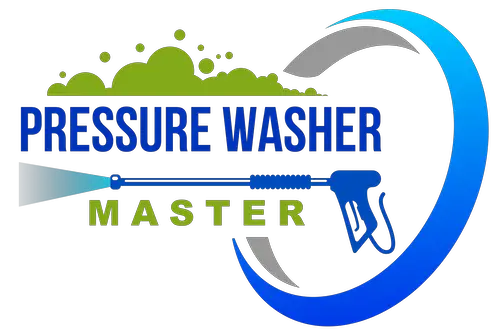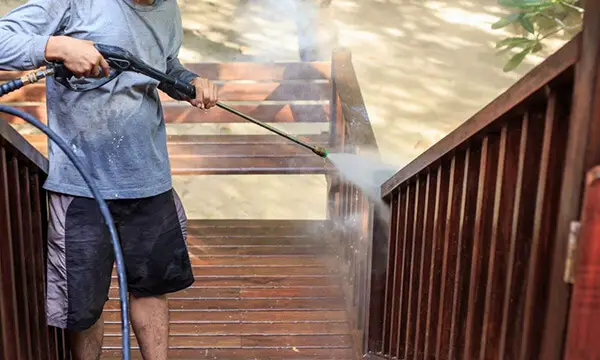When it comes to restoring the brilliance of your property, the benefits of soft wash vs. pressure wash should be carefully considered.
You’re undoubtedly aware that maintaining your home in good shape necessitates frequent cleaning. The worst stains and filth, on the other hand, may necessitate the use of specialized equipment or professional assistance, such as soft washing or pressure cleaning. Soft washing and pressure washing both employ similar instruments, but they differ in essential ways that make them suitable for different jobs.
In today’s review, we’ll cover all you need to know about soft washing vs. pressure washing.
Overview about Soft Wash Vs. Pressure Wash
When choosing a pressure washer, this is the most crucial decision you’ll make. Both soft and power washers are pressure washers because they employ PUMPS to increase the pressure of the water beyond what the faucet offers. The difference is in the amount of pressure applied and the amount of cleaning force required.
Pressure Wash
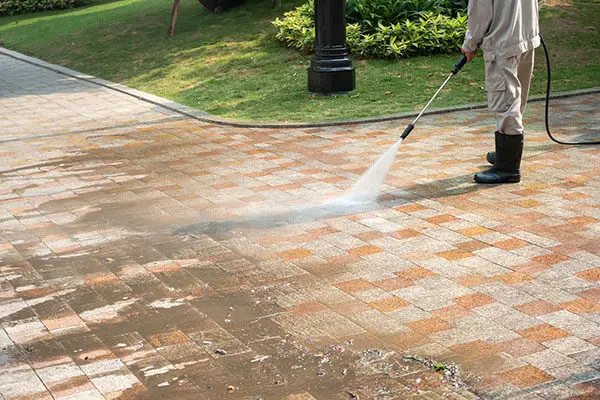
A high-pressure spray is used to blast dirt off of surfaces during pressure washing. The pressure utilized in this technique is often significantly higher than what can be achieved with mild washing, making it ideal for homes with stubborn stains or paint.
The disadvantage of utilizing pressure washers is that they are prone to causing harm to delicate surfaces.
Furthermore, the tremendous pressure of the water spray might harm surfaces that you don’t want it to reach, such as brick or stone.
Soft Wash
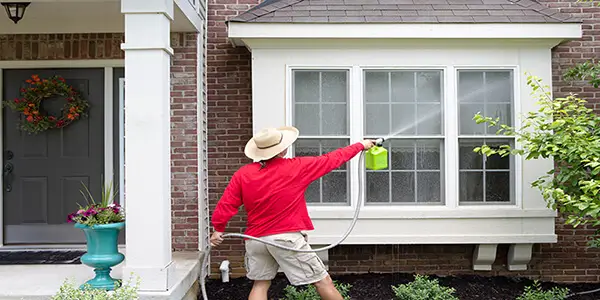
Soft washing is a modified type of pressure washing that cleans surfaces with high volumes of water at low pressures and chemical additives. The operational PSI of a Soft Wash arrangement is generally less than 700 PSI, with a GPM output of more than 6 GPM. This permits a large amount of water to be poured over a surface.
A soft wash unit’s fan design is also broader to avoid damaging the surface. Furthermore, a soft washing device can handle harsh chemicals being pumped through the pump, but a pressure washer cannot usually withstand strong chemicals being pumped through the pump.
Pros And Cons Of Pressure Washing
Pros
One of the advantages of pressure washing is the ease with which you can rent or own the machine—having one of your own may make cleaning the driveway or siding quite simple and quick. Furthermore, some individuals value the ease of being able to use a pressure washer whenever they need it without having to arrange a team.
Cons
There are several other serious drawbacks to utilizing a pressure washer on your outside surfaces. One is that its high PSI can be challenging for someone unprepared, causing them or others to be injured.
Water can be blown up behind your siding and overhangs, and into your soffit, due to the high pressure utilized on your siding. Water from your soffit can leak into your attic, soaking your insulation.
We’ve discussed how moisture in the attic may lead to rot or mould development several times, so this is something to avoid at all costs. Pressure washing your siding might produce streaks on spots where the siding is cleaner than others.
Overall, pressure washing is a risky and harmful method of cleaning your siding and other outside surfaces that isn’t always successful.
Pros And Cons Of Soft Washing
Pros
Soft wash systems, for starters, require significantly less water pressure while being more effective since they employ a combination of high-quality soaps, bleach, and water.
Unlike pressure washing, which only utilizes water, the soft washing technology cleans your siding while also killing any algae or bacteria development on your home. Furthermore, all of this can be completed in a single day and will last you far longer while causing no harm to your home’s exteriors.
Cons
Certain stains may not be removed. It is effective against a wide range of filth, although some stains, such as embedded dirt, require the use of a strong pressure washer.
Cleaning will take longer. Because cleaning chemicals are used, it may take longer to complete than pressure washing.
Pressure Washing vs. Soft Washing
Pressure
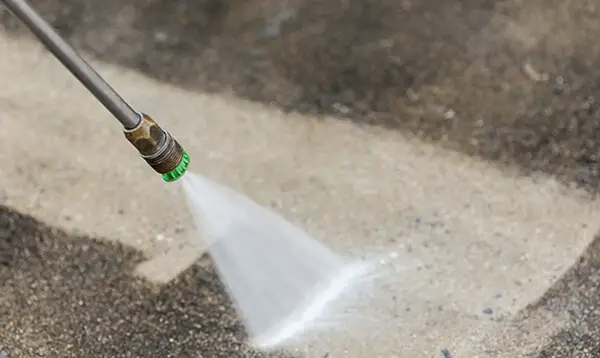
A significant distinction between soft wash vs. pressure wash, as you might have guessed from the titles, is that one utilizes high pressure while the other uses low. Pressure washing involves the use of high-pressure water with a pressure range of 1300 to 3100 PSI. Meanwhile, soft washing consumes far less energy and functions similarly to a powerful hose.
Chemicals
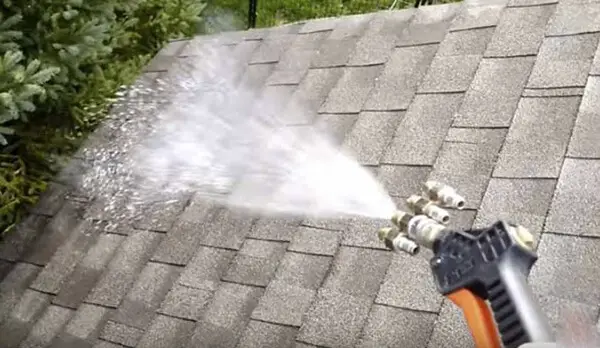
Another distinction between soft washing and pressure washing is what comes out of the hose. While a pressure wash depends only on high-pressure water to clean, soft washing systems combine soaps, bleach, and water to guarantee your exterior remains clean for the long haul.
Cost
A commercial pressure washing machine is utilized for both pressure and soft washing, and it should be used on all projects.
The commercial washer will distribute and dilute cleaning solutions appropriately during pre-rinse and apply the optimum volume-to-pressure ratio for the relevant surfaces for a soft wash.
Because experts use the same machine for both operations, the expenses of pressure washing and soft washing are comparable, regardless of whether you hire a specialist or handle the nozzle yourself.
Material
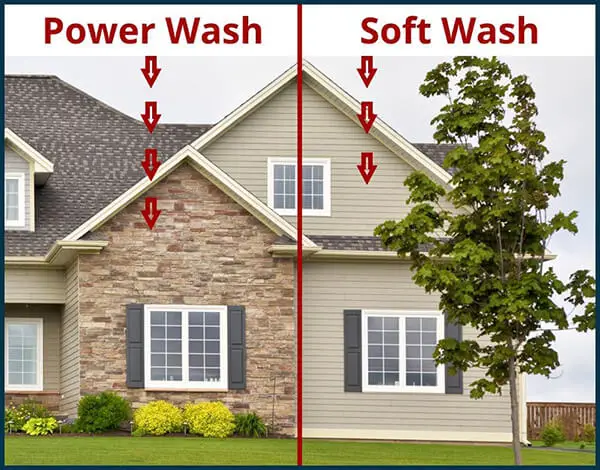
Depending on what you need to clean, you should use a mild wash or a power wash. While pressure washing is incredibly effective, its power can harm a variety of surfaces.
Concrete driveways, vehicles, treated wood decking can withstand pressure washing, while vinyl, cedar shake, paver, brick, tile roofs, stucco or wood panel siding are better with soft washing.
When Should You Use Soft Washing vs. Pressure Washing?
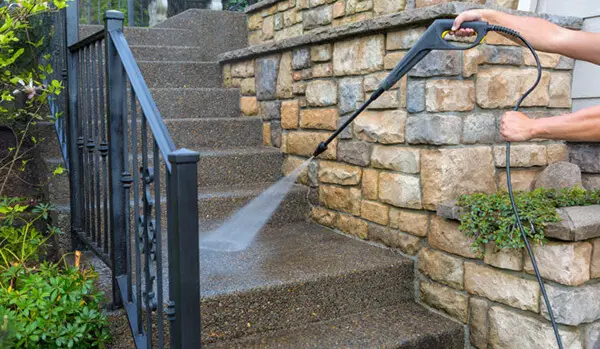
Cleaning procedures such as soft washing and power washing are both quite efficient. Your option will be determined by the extent of your outside home cleaning requirements. A pressure wash could be a better option if you need to remove dirt and grime from your driveway. Meanwhile, a soft wash will thoroughly clean the surface without causing harm if you need to clean your roof.
When selecting a cleaning method, consider the impact it will have on your property. Although pressure washing is efficient, it does not offer the same level of certainty as soft cleaning.
Because of the tremendous pressure, pressure washing, for example, may cause damage to your property or landscaping. Soft washing may still accomplish the job without posing any risks.
Aside from deciding between soft washing and pressure washing, you must also guarantee that you can adequately clean the exterior of your home. It’s always advisable to hire a professional pressure cleaning service to truly limit damage to your house. They will have knowledge and experience in both cleaning systems, as well as the necessary equipment.
Conclusion
Soft washing will be perfect for cleaning surfaces that might be harmed by high pressure since it will give more effective cleaning with less danger.
However, because the equipment isn’t always readily available, you can typically get by with a pressure washer if you carefully control the pressure you’ll be spraying at, use a proper tip, and accept that there’s a little chance of harming the surface.
Understanding the distinctions between soft wash vs. pressure wash can aid you in selecting the best cleaning equipment for your job.
